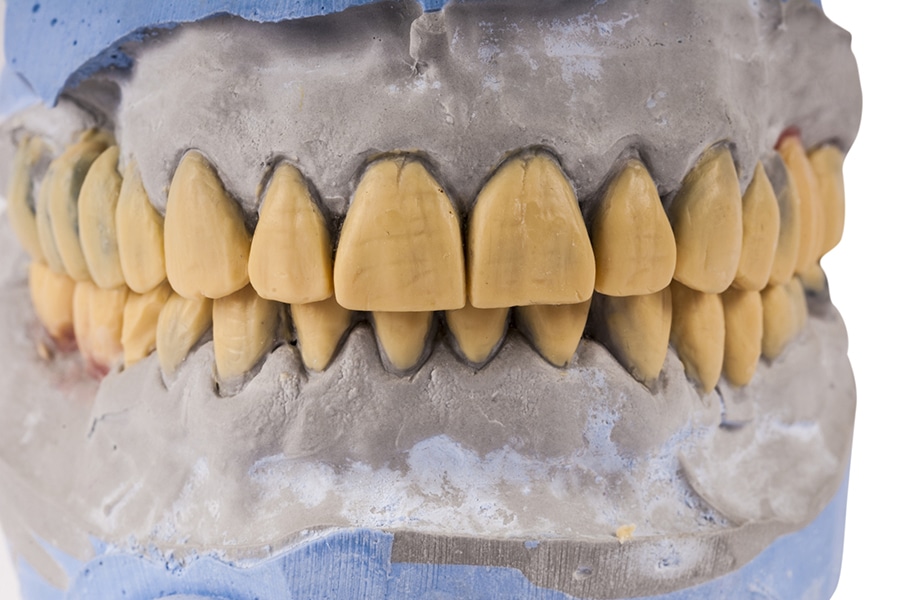Dental erosion is a common issue among patients. While your teeth may be strong and able to chew through the toughest of steaks and hardest candies, they are not unbreakable and should be treated with care.
It’s essential to know the signs of tooth erosion, what causes this issue, and how to prevent it.
Tooth Erosion Symptoms
Symptoms of erosion vary, and some patients may not experience any symptoms at all before we catch the problem, but the good news is that decay is treatable! If you notice any of these signs, schedule an appointment with our dentist immediately.
- Changes in tooth color, such as yellowing or discolored teeth
- Pain anywhere in your tooth, jaw, or mouth
- Sensitivity in the tooth
- Chipped or cracked teeth
- Teeth that are becoming translucent
- Cupping, which looks like dents in the tooth
Causes
There are many reasons why you may experience tooth erosion. Above all, enamel erosion is caused by decay. The following are common causes of tooth decay.
Acid reflux: People who have acid reflux or GERD may experience tooth erosion. Due to an increase in stomach acid, which can be very harsh, your mouth may sustain damage.
Bulimia: This disease specifically can negatively affect the mouth. Purging brings stomach acid into your mouth, which can significantly damage your teeth over time.
Poor oral hygiene: Properly brushing your teeth is vital to stave off tooth decay. Flossing also helps in the fight against erosion.
Foods and beverages: Acidic and sugary foods and drinks, such as fruit juice, can erode the tooth surface and lead to cavities.
Grinding your teeth: Bruxism
Xerostomia: (dry mouth) – a sign of diabetes
Medications: Antihistamines and aspirin
Wear and tear: Brushing too hard and chewing your fingernails, tobacco, and pens can lead to enamel wear and tear. Using toothpicks is also bad for your teeth, as they can cause the enamel to wear down as well.
Stages of Enamel Erosion
Stage 1: White Spots/Demineralization
During this stage, you may notice white spots appearing on the surface of your tooth as it loses minerals.
Stage 2: Enamel Decay
Enamel decay is still in the early stages of tooth decay. This is the stage cavities form as tiny holes in your teeth. Cavities may appear brown or black.
Stage 3: Dentin Decay
Dentin is extremely sensitive. If the decay has reached the dentin, you will likely experience hot or cold sensitivity when eating and drinking. Once the decay reaches the dentin, it will begin to accelerate.
Stage 4: Damage to The Pulp
At this point, the damage has entered into advanced stages of tooth erosion. Living cells produce dentin in the pulp of the tooth. The pulp consists of the nerves within your tooth as well as the blood vessels. Damage to this part of the tooth can be excruciating.
Stage 5: Abscess Formation
Infection and pus cause an abscess in the tooth. To remedy an abscess, tooth extraction or root canal will be necessary.
Prevention
Make regular visits to the dentist and keep your appointments. Many patients put off their dental cleanings, but it’s essential to have your teeth cleaned by a professional. At these checkups, we will also check for signs of tooth erosion. We will be able to spot issues and fix them before they become more painful and expensive problems down the road.
Use fluoride toothpaste, as fluoride can be a big help to better oral health. Fluoride not only helps prevent tooth decay but can reverse the early stages.
You can find fluoride in toothpaste, some mouthwashes, and most tap water supplies as well.
Avoid snacking frequently, as constant snacking will increase the amount of acid in your mouth, giving the bacteria in your mouth more to feed on throughout the day.
Rinse your mouth after eating or drinking anything acidic or sugary. If you are unable to rinse, chew sugar-free gum to produce more saliva, as the saliva helps wash away acid from your teeth.
Treatment for Erosion
Sometimes, we do all we can to maintain proper oral hygiene and still end up with cavities. Some people are more prone to dental decay than others. However, you must see a dentist immediately to keep the problem from getting worse.
Whether you need a filling for a small cavity, tooth bonding, or a root canal, our team is here to provide you with gentle care and answer all of your questions along the way. We aim for our patients to be as comfortable as possible and ease any nerves they have. If you are ready to schedule an appointment, give us a call at 480-838-3033.

